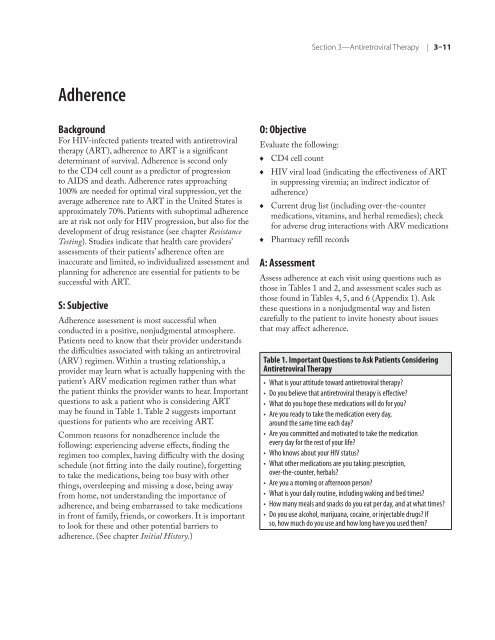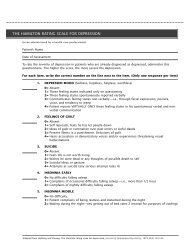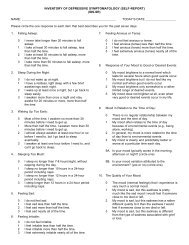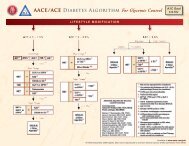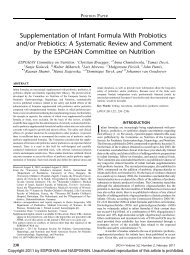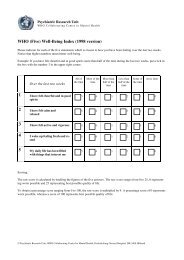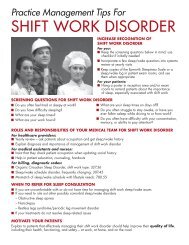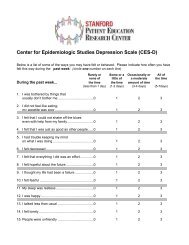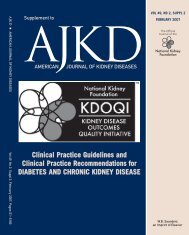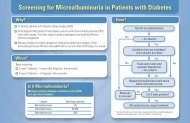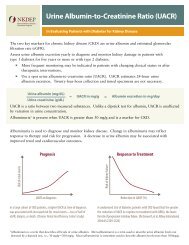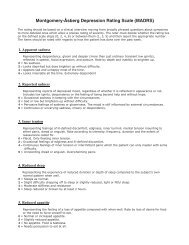Clinical Manual for Management of the HIV-Infected ... - myCME.com
Clinical Manual for Management of the HIV-Infected ... - myCME.com
Clinical Manual for Management of the HIV-Infected ... - myCME.com
You also want an ePaper? Increase the reach of your titles
YUMPU automatically turns print PDFs into web optimized ePapers that Google loves.
Adherence<br />
Background<br />
For <strong>HIV</strong>-infected patients treated with antiretroviral<br />
<strong>the</strong>rapy (ART), adherence to ART is a significant<br />
determinant <strong>of</strong> survival. Adherence is second only<br />
to <strong>the</strong> CD4 cell count as a predictor <strong>of</strong> progression<br />
to AIDS and death. Adherence rates approaching<br />
100% are needed <strong>for</strong> optimal viral suppression, yet <strong>the</strong><br />
average adherence rate to ART in <strong>the</strong> United States is<br />
approximately 70%. Patients with suboptimal adherence<br />
are at risk not only <strong>for</strong> <strong>HIV</strong> progression, but also <strong>for</strong> <strong>the</strong><br />
development <strong>of</strong> drug resistance (see chapter Resistance<br />
Testing). Studies indicate that health care providers’<br />
assessments <strong>of</strong> <strong>the</strong>ir patients’ adherence <strong>of</strong>ten are<br />
inaccurate and limited, so individualized assessment and<br />
planning <strong>for</strong> adherence are essential <strong>for</strong> patients to be<br />
successful with ART.<br />
S: Subjective<br />
Adherence assessment is most successful when<br />
conducted in a positive, nonjudgmental atmosphere.<br />
Patients need to know that <strong>the</strong>ir provider understands<br />
<strong>the</strong> difficulties associated with taking an antiretroviral<br />
(ARV) regimen. Within a trusting relationship, a<br />
provider may learn what is actually happening with <strong>the</strong><br />
patient’s ARV medication regimen ra<strong>the</strong>r than what<br />
<strong>the</strong> patient thinks <strong>the</strong> provider wants to hear. Important<br />
questions to ask a patient who is considering ART<br />
may be found in Table 1. Table 2 suggests important<br />
questions <strong>for</strong> patients who are receiving ART.<br />
Common reasons <strong>for</strong> nonadherence include <strong>the</strong><br />
following: experiencing adverse effects, finding <strong>the</strong><br />
regimen too <strong>com</strong>plex, having difficulty with <strong>the</strong> dosing<br />
schedule (not fitting into <strong>the</strong> daily routine), <strong>for</strong>getting<br />
to take <strong>the</strong> medications, being too busy with o<strong>the</strong>r<br />
things, oversleeping and missing a dose, being away<br />
from home, not understanding <strong>the</strong> importance <strong>of</strong><br />
adherence, and being embarrassed to take medications<br />
in front <strong>of</strong> family, friends, or coworkers. It is important<br />
to look <strong>for</strong> <strong>the</strong>se and o<strong>the</strong>r potential barriers to<br />
adherence. (See chapter Initial History.)<br />
O: Objective<br />
Evaluate <strong>the</strong> following:<br />
♦<br />
♦<br />
♦<br />
♦<br />
CD4 cell count<br />
Section 3—Antiretroviral Therapy | 3–11<br />
<strong>HIV</strong> viral load (indicating <strong>the</strong> effectiveness <strong>of</strong> ART<br />
in suppressing viremia; an indirect indicator <strong>of</strong><br />
adherence)<br />
Current drug list (including over-<strong>the</strong>-counter<br />
medications, vitamins, and herbal remedies); check<br />
<strong>for</strong> adverse drug interactions with ARV medications<br />
Pharmacy refill records<br />
A: Assessment<br />
Assess adherence at each visit using questions such as<br />
those in Tables 1 and 2, and assessment scales such as<br />
those found in Tables 4, 5, and 6 (Appendix 1). Ask<br />
<strong>the</strong>se questions in a nonjudgmental way and listen<br />
carefully to <strong>the</strong> patient to invite honesty about issues<br />
that may affect adherence.<br />
Table 1. Important Questions to Ask Patients Considering<br />
Antiretroviral Therapy<br />
•<br />
•<br />
•<br />
•<br />
•<br />
•<br />
•<br />
•<br />
•<br />
•<br />
•<br />
What is your attitude toward antiretroviral <strong>the</strong>rapy?<br />
Do you believe that antiretroviral <strong>the</strong>rapy is effective?<br />
What do you hope <strong>the</strong>se medications will do <strong>for</strong> you?<br />
Are you ready to take <strong>the</strong> medication every day,<br />
around <strong>the</strong> same time each day?<br />
Are you <strong>com</strong>mitted and motivated to take <strong>the</strong> medication<br />
every day <strong>for</strong> <strong>the</strong> rest <strong>of</strong> your life?<br />
Who knows about your <strong>HIV</strong> status?<br />
What o<strong>the</strong>r medications are you taking: prescription,<br />
over-<strong>the</strong>-counter, herbals?<br />
Are you a morning or afternoon person?<br />
What is your daily routine, including waking and bed times?<br />
How many meals and snacks do you eat per day, and at what times?<br />
Do you use alcohol, marijuana, cocaine, or injectable drugs? If<br />
so, how much do you use and how long have you used <strong>the</strong>m?


